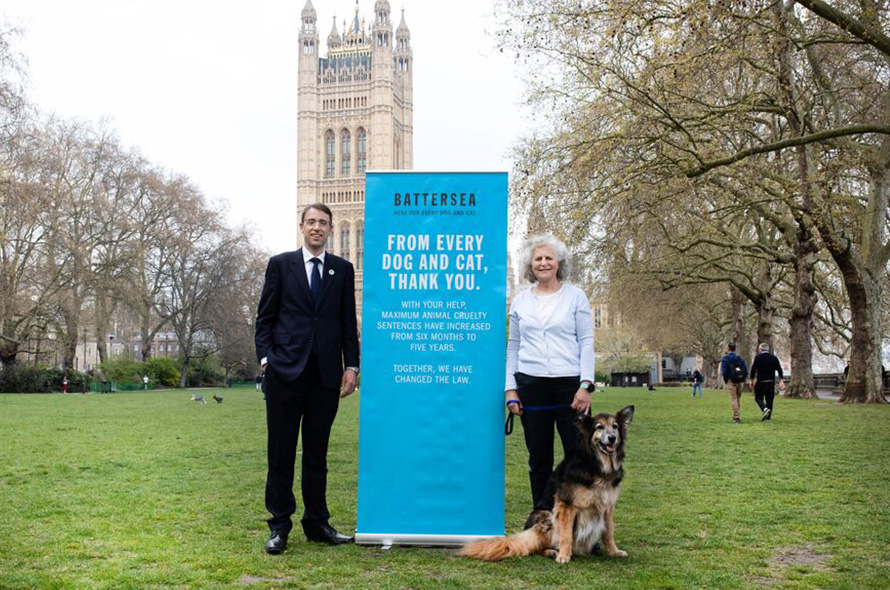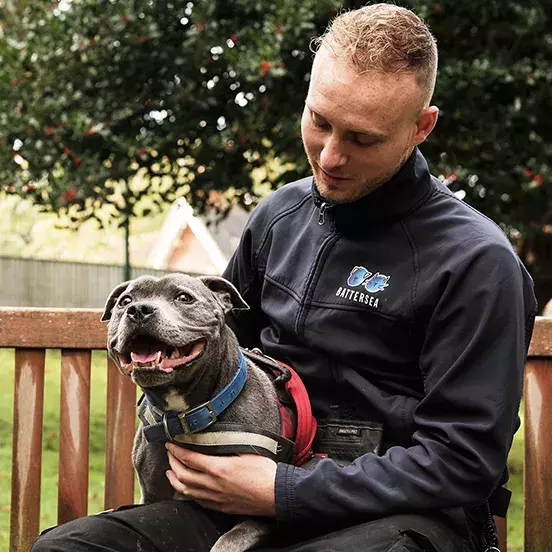In April 2021, after almost five years of campaigning led by Battersea, the UK Government finally changed the law to increase the maximum sentence for the worst cases of animal cruelty in England and Wales from six months to five years. Scotland introduced the same change in July 2020, after a similar Battersea campaign. It’s been a long, hard road and its success is a testament to all the backing we’ve received from Battersea’s supporters.
So how did we get here and what did we learn?

How it all started
In 2016, Battersea ran a panel event at the Conservative Party conference where we first called for five-year maximum sentences to be introduced. The room was packed, and the response overwhelmingly positive. In the same year, following a horrific attack on an innocent Bulldog named Baby in her constituency, Labour MP Anna Turley introduced a Private Member’s Bill looking to bring about real change.
The following year Battersea launched its #NotFunny campaign with the support of famous comedians, alongside tens of thousands of animal lovers, calling for stronger animal cruelty penalties. We needed to show this change was vital and would make a real difference, so we released research into sentencing which compared maximum sentences across jurisdictions, examined how the then-current laws were being applied, and explored the serious nature of animal cruelty sentences. The public were asked to show their support by emailing their MPs or MSPs, which they would do in their thousands over the years that followed.
A commitment to change
The campaign was a major success. High profile supporters Paul O’Grady, Sue Perkins, Tracey Ullman, Harry Hill and Ricky Gervais helped capture the public’s imagination and fired people up to take action.
Politicians simply could not ignore the strength of feeling. The Government announced its support for five-year sentences just before the 2017 Conservative conference and in December that year the then-Environment Secretary Michael Gove visited Battersea to announce a draft bill. Support for the move remained strong, with tougher sentences a feature of all the major political parties’ manifestos before the 2019 General Election.
The campaign was also recognised across the charity sector and Battersea were the proud winners of a range of awards for both its message and our campaigning.
Change delayed
Despite the widespread support, there have been many hurdles to overcome. MP Anna Turley’s Bill fell in 2017 and a separate Bill that combined increased sentencing with legal recognition of animal sentience also failed to make progress. The Government introduced a version of the Bill to increase the maximum sentence in June 2019, following concerted pressure from our thousands of supporters, but it then fell at the Queen’s Speech, which is when the Government breaks off its ongoing law-making and announces the new legislation it wants to create. It was a frustrating period, but for the sake of animals like Baby, we knew we had to keep going.
The Bill was reintroduced again when Parliament returned but fell only weeks later due to the General Election called in late 2019. In February 2020 it returned yet again, this time thanks to Conservative MP Chris Loder who introduced his own Private Member’s Bill. However, the COVID-19 crisis and Brexit negotiations disrupted the parliamentary timetable once again.
Scotland marched ahead
The campaign crossed borders. As well as in England and Wales, Battersea had also championed the cause of five-year sentences in Scotland, organising a three-day-long pledge event in Scotland’s Parliament in 2018 where MSPs signed up to show their support and to discuss the issue with us.
The Scottish Parliament introduced five-year sentences in June 2020, a move supported by all of Scotland’s biggest political parties, and animal lovers across the country.
The final hurdle
In Westminster, we fought hard to secure support for MP Chris Loder’s Bill, organising an event in Parliament attended by over 100 politicians who pledged their support. We produced research and briefings to provide information in support as the Bill made its way through Parliament and received recognition from MPs and Peers for our work. Then, on 29 April 2021, with hours to spare before the Queen’s Speech, the Bill was finally passed.
At the same time the Welsh Government, who we’d also been working closely with, passed a motion to introduce the legislation in Wales.
On June 29, 2021, the new law came into effect. Finally, the whole of the UK has five-year maximum sentences for animal cruelty. Northern Ireland increased maximum sentencing back in 2016.
What the future brings
The law has changed but our work is not complete. The new sentences will now be reviewed by the Sentencing Council, an independent body who will advise how they should be applied in practice. Here at Battersea we will press on and keep making our voice heard to make sure that tougher sentences for the worst offences are a reality, not just a legal possibility.
We’ll also continue to campaign on animal welfare issues, tackling cruelty wherever we see it. Find out more about our campaigning work on behalf of animals everywhere, and discover how you can get involved and lend them your voice.


